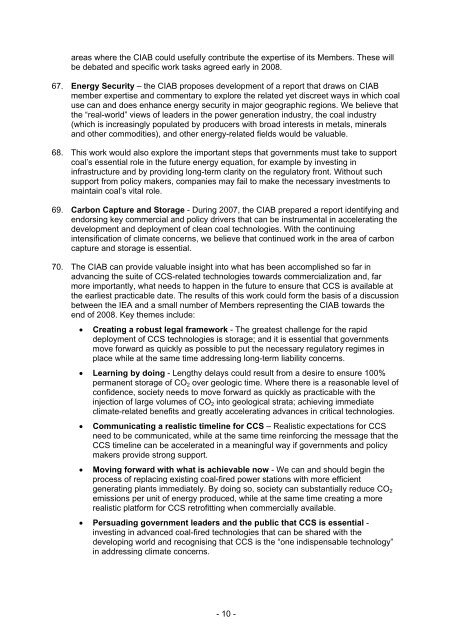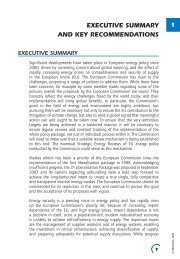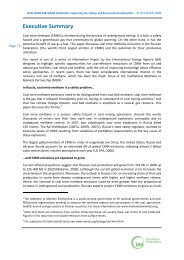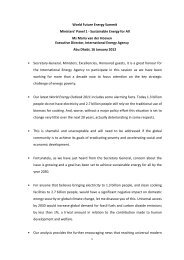CIAB Market & Policy developments 2005/06 - IEA
CIAB Market & Policy developments 2005/06 - IEA
CIAB Market & Policy developments 2005/06 - IEA
Create successful ePaper yourself
Turn your PDF publications into a flip-book with our unique Google optimized e-Paper software.
areas where the <strong>CIAB</strong> could usefully contribute the expertise of its Members. These will<br />
be debated and specific work tasks agreed early in 2008.<br />
67. Energy Security – the <strong>CIAB</strong> proposes development of a report that draws on <strong>CIAB</strong><br />
member expertise and commentary to explore the related yet discreet ways in which coal<br />
use can and does enhance energy security in major geographic regions. We believe that<br />
the “real-world” views of leaders in the power generation industry, the coal industry<br />
(which is increasingly populated by producers with broad interests in metals, minerals<br />
and other commodities), and other energy-related fields would be valuable.<br />
68. This work would also explore the important steps that governments must take to support<br />
coal’s essential role in the future energy equation, for example by investing in<br />
infrastructure and by providing long-term clarity on the regulatory front. Without such<br />
support from policy makers, companies may fail to make the necessary investments to<br />
maintain coal’s vital role.<br />
69. Carbon Capture and Storage - During 2007, the <strong>CIAB</strong> prepared a report identifying and<br />
endorsing key commercial and policy drivers that can be instrumental in accelerating the<br />
development and deployment of clean coal technologies. With the continuing<br />
intensification of climate concerns, we believe that continued work in the area of carbon<br />
capture and storage is essential.<br />
70. The <strong>CIAB</strong> can provide valuable insight into what has been accomplished so far in<br />
advancing the suite of CCS-related technologies towards commercialization and, far<br />
more importantly, what needs to happen in the future to ensure that CCS is available at<br />
the earliest practicable date. The results of this work could form the basis of a discussion<br />
between the <strong>IEA</strong> and a small number of Members representing the <strong>CIAB</strong> towards the<br />
end of 2008. Key themes include:<br />
• Creating a robust legal framework - The greatest challenge for the rapid<br />
deployment of CCS technologies is storage; and it is essential that governments<br />
move forward as quickly as possible to put the necessary regulatory regimes in<br />
place while at the same time addressing long-term liability concerns.<br />
• Learning by doing - Lengthy delays could result from a desire to ensure 100%<br />
permanent storage of CO 2 over geologic time. Where there is a reasonable level of<br />
confidence, society needs to move forward as quickly as practicable with the<br />
injection of large volumes of CO 2 into geological strata; achieving immediate<br />
climate-related benefits and greatly accelerating advances in critical technologies.<br />
• Communicating a realistic timeline for CCS – Realistic expectations for CCS<br />
need to be communicated, while at the same time reinforcing the message that the<br />
CCS timeline can be accelerated in a meaningful way if governments and policy<br />
makers provide strong support.<br />
• Moving forward with what is achievable now - We can and should begin the<br />
process of replacing existing coal-fired power stations with more efficient<br />
generating plants immediately. By doing so, society can substantially reduce CO 2<br />
emissions per unit of energy produced, while at the same time creating a more<br />
realistic platform for CCS retrofitting when commercially available.<br />
• Persuading government leaders and the public that CCS is essential -<br />
investing in advanced coal-fired technologies that can be shared with the<br />
developing world and recognising that CCS is the “one indispensable technology”<br />
in addressing climate concerns.<br />
- 10 -
















